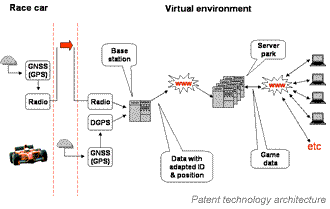The billions of dollars spent each year on the space program sometimes translate into practical real world improvements; if you don't know the value of Tang (1) and pens that write upside-down (2), you have just never tried them.
It's no different in Europe. The European Space Agency (ESA) developed Global Navigation Satellite Systems (GNSS), e.g. GPS, satellite navigation technology which allows real-time transmission of telemetric data from lots of objects on the ground and a start-up called iOpener did what you might expect with it; they used it to make a racing game, where you can compete against professionals during the race itself.
"Our product enables gamers to race live against professionals – they don't have to be a 'Schumacher' to enjoy it," says Andy Lürling, CEO and co-founder of iOpener, "it is a total immersion experience."

'Immersion' as in crashes? No, the only thing that happens if you run into a real driver virtually during a race will be a restart if your virtual car didn't get damaged too much, which sounds sort of one-sided. Maybe it would be better if they have Hall of Fame competitors mixed in with real racers. Who wouldn't want to be wrecked by 1976 Formula One champion James Hunt, since he wrecked everyone else?
They do say they will have other hooks for immersion. They say that eventually they will invite the best virtual drivers into the TV studio to race in front of the camera and a live audience during real races.
How well will it work? No one is sure, but the proof-of-concept was good enough to convince German venture capitalist Triangle to invest €4.1 million. They're also headquartered at the ESA site in Noordwijk, the Netherlands, so they have little in the way of the ordinary expenses and pressure a regular corporate start-up would face.
"The space industry holds an almost infinite amount of technologies (3) that can be transformed with the right idea and concept into successful start-up businesses in the non-space sector," explains Bruno Naulais, ESA Business Incubation Manager.
Though it will be tough knocking pens that write upside-down off of their private sector success pedestal. (4)
NOTES:
(1) Okay, the space program didn't invent Tang, they just made it famous when astronauts started drinking it. So just upside-down pens.
(2) Okay, the space program didn't invent the pen that writes upside-down either. That was invented by the Fisher company.
(3) Like what? We're stumped after Tang and upside-down pens.
(4) We called some people at NASA and asked if the space program had actually invented things used in the private sector and they mumbled something about something that led to MRIs and seeing weather patterns after they've already happened.
So we really hope this racing thing works out. The space program needs a win.




Comments